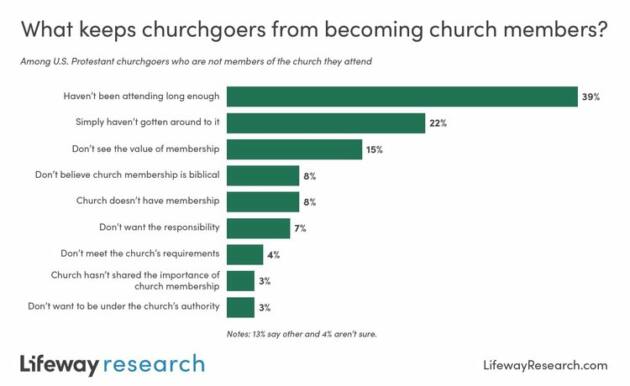Christians regularly attending weekly services also likely to be church members

If someone is regularly sitting in a church pew, their name is probably also on the church membership roll.
According to a Lifeway Research study, around four in five U.S. adults who attend a Protestant church in a typical month are members of that congregation. Specifically, 82% of regular churchgoers say they are currently a member of the church they attend. Fewer than one in five (17%) say they’re not a member, while 1% aren’t sure.
“It is typical for Protestant churches to have formal membership of some kind,” said Scott McConnell, executive director of Lifeway Research. “However, churches can place different points of emphasis on becoming a member that could influence who formally joins. Some congregations highlight that membership signifies the biblical pattern of every believer belonging to a local church and others use it as a prerequisite for serving in specific roles or participating in congregational votes. Churches can also focus on their commitment to the member or ask members to commit to God and each other in specific practices.”
Unsurprisingly, those who attend more frequently are more likely to also be members. Churchgoers who attend a worship service at least four times a month are more likely to be a member of that church than those who attend one to three times a month (88% vs. 74%).
Those who attend a Restorationist movement church (92%) are more likely than those going to a non-denominational (77%) or Methodist church (75%) to be a member.
Additionally, churchgoing men are more likely than their female counterparts to be members (86% vs. 79%). Those who graduated college (86%) are more likely than those with some college or less formal education (80%) to say they’re also a church member.
Meanwhile, white churchgoers (18%) are among the most likely to say they aren’t a member at their church.
Reasons for not being a church member
Among those who attend who are not currently a member, most say it’s more a matter of time than an active choice.
Around two in five (39%) say they aren’t a member because they haven’t been attending their current church long enough. Almost a quarter (22%) say they simply haven’t gotten around to it.
Fewer say they don’t see the value in church membership (15%), don’t believe church membership is biblical (8%), don’t want the responsibility (7%) or don’t want to be under the church’s authority (3%).
Some place the responsibility on their church, as 8% say their church doesn’t have membership, 4% don’t meet the church’s requirements for membership and 3% say the church has not shared the importance of membership. Around one in eight (13%) say it’s another reason, and 4% aren’t sure.
“Among churchgoers who are not church members, there does not appear to be much urgency or conviction that it is needed. This should compel churches who do value membership to communicate this more clearly,” said McConnell.
Denominationally, those most likely to be different are two groups often viewed as similar — Baptists and those at non-denominational churches. Non-denominational churchgoers are more likely than Baptists to say their churches do not have membership (18% vs. 1%).
Meanwhile, Baptist churchgoers who say they aren’t a member are around three times more likely than those at non-denominational churches to say it’s because they just haven’t gotten around to it. (29% vs. 9%).
Additionally, those who attend less frequently are more likely to say it just hasn’t happened yet. Churchgoers who attend a worship service one to three times a month are more likely than those who attend four or more times a month to say they simply haven’t gotten around to becoming a member (26% vs. 15%).
“Churches whose decisions are made by staff or elders may not have membership. Whereas churches with a congregational form of government in which members vote on decisions, may unintentionally discourage people from becoming members who have no interest in decision making,” said McConnell. “Also, those who attend less frequently typically do not have weekly responsibilities at church, and some of those roles would require membership.”
Attendance has become a topic of national news outlet with the New York Times reporting that Black Gen-Z are not attending church.
For more information, view the complete report.
Aaron Earls s the senior writer at Lifeway Research.









